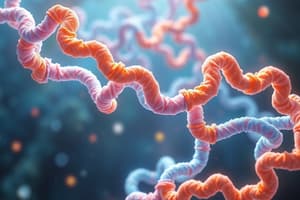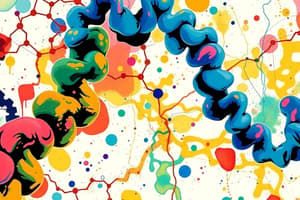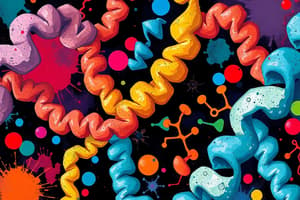Podcast
Questions and Answers
Which amino acid is involved in the synthesis of serotonin and vitamin B3?
Which amino acid is involved in the synthesis of serotonin and vitamin B3?
- Glutamic acid
- Tyrosine
- Tryptophan (correct)
- Histidine
What hormone is synthesized from the amino acid tyrosine?
What hormone is synthesized from the amino acid tyrosine?
- Gamma amino butyric acid (GABA)
- Serotonin
- Histamine
- Epinephrine (correct)
Which amino acid can be converted into histamine?
Which amino acid can be converted into histamine?
- Glycine
- Arginine
- Histidine (correct)
- Tryptophan
Which amino acids are utilized in the synthesis of creatine?
Which amino acids are utilized in the synthesis of creatine?
Which amino acids are involved in the synthesis of glutathione?
Which amino acids are involved in the synthesis of glutathione?
Flashcards are hidden until you start studying
Study Notes
Biological Functions of Amino Acids
- Amino acids are the building blocks of proteins.
- Tyrosine is used to synthesize:
- Thyroid hormones (T3, T4)
- Epinephrine and norepinephrine (neurotransmitters)
- Melanin (pigment)
- Tryptophan is used to synthesize:
- Serotonin (neurotransmitter)
- Vitamin B3 (niacin)
- Histidine is converted into histamine (neurotransmitter)
- Glycine is used for the synthesis of:
- Heme (component of hemoglobin)
- Creatine (muscle energy source)
- Bile salts (aid in fat digestion)
- Glutathione (antioxidant)
- Glutamic acid is used to synthesize GABA (neurotransmitter)
- Arginine and methionine are also used to synthesize creatine.
- Glutamate, cysteine, and glycine are used to synthesize glutathione.
- Aspartate and glutamine are used to synthesize pyrimidines (bases found in DNA and RNA).
- Glycine, aspartic acid, glutamine, and serine are used to synthesize purines (bases found in DNA and RNA).
Studying That Suits You
Use AI to generate personalized quizzes and flashcards to suit your learning preferences.




